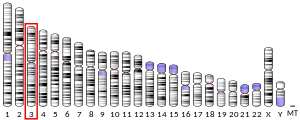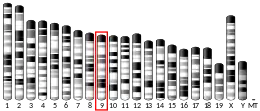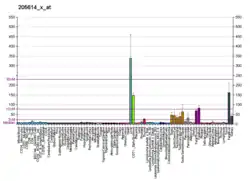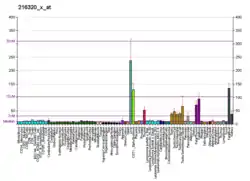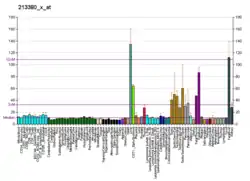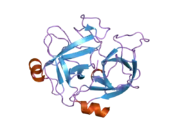MST1
Macrophage-stimulating protein (MSP), also known as hepatocyte growth factor-like protein (HLP, HGFL, or HGFLP), is a protein that in humans is encoded by the MST1 (macrophage-stimulating 1) gene.[5][6][7]
| MST1 | |||||||||||||||||||||||||||||||||||||||||||||||||||
|---|---|---|---|---|---|---|---|---|---|---|---|---|---|---|---|---|---|---|---|---|---|---|---|---|---|---|---|---|---|---|---|---|---|---|---|---|---|---|---|---|---|---|---|---|---|---|---|---|---|---|---|
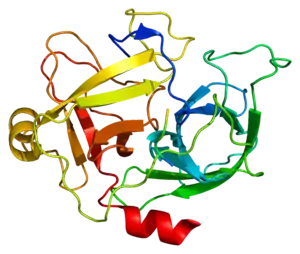 | |||||||||||||||||||||||||||||||||||||||||||||||||||
| |||||||||||||||||||||||||||||||||||||||||||||||||||
| Identifiers | |||||||||||||||||||||||||||||||||||||||||||||||||||
| Aliases | MST1, D3F15S2, DNF15S2, HGFL, MSP, NF15S2, macrophage stimulating 1 | ||||||||||||||||||||||||||||||||||||||||||||||||||
| External IDs | OMIM: 142408 MGI: 96080 HomoloGene: 7360 GeneCards: MST1 | ||||||||||||||||||||||||||||||||||||||||||||||||||
| |||||||||||||||||||||||||||||||||||||||||||||||||||
| |||||||||||||||||||||||||||||||||||||||||||||||||||
| |||||||||||||||||||||||||||||||||||||||||||||||||||
| |||||||||||||||||||||||||||||||||||||||||||||||||||
| |||||||||||||||||||||||||||||||||||||||||||||||||||
| Wikidata | |||||||||||||||||||||||||||||||||||||||||||||||||||
| |||||||||||||||||||||||||||||||||||||||||||||||||||
References
- GRCh38: Ensembl release 89: ENSG00000173531 - Ensembl, May 2017
- GRCm38: Ensembl release 89: ENSMUSG00000032591 - Ensembl, May 2017
- "Human PubMed Reference:". National Center for Biotechnology Information, U.S. National Library of Medicine.
- "Mouse PubMed Reference:". National Center for Biotechnology Information, U.S. National Library of Medicine.
- Gerber MJ, Drabkin HA, Firnhaber C, Miller YE, Scoggin CH, Smith DI (Oct 1988). "Regional localization of chromosome 3-specific DNA fragments by using a hybrid cell deletion mapping panel". Am J Hum Genet. 43 (4): 442–51. PMC 1715492. PMID 2902784.
- Yoshimura T, Yuhki N, Wang MH, Skeel A, Leonard EJ (Aug 1993). "Cloning, sequencing, and expression of human macrophage stimulating protein (MSP, MST1) confirms MSP as a member of the family of kringle proteins and locates the MSP gene on chromosome 3". J Biol Chem. 268 (21): 15461–8. doi:10.1016/S0021-9258(18)82279-7. PMID 8393443.
- "Entrez Gene: MST1 macrophage stimulating 1 (hepatocyte growth factor-like)".
Further reading
- Han S, Stuart LA, Degen SJ (1991). "Characterization of the DNF15S2 locus on human chromosome 3: identification of a gene coding for four kringle domains with homology to hepatocyte growth factor". Biochemistry. 30 (40): 9768–80. doi:10.1021/bi00104a029. PMID 1655021.
- Skeel A, Yoshimura T, Showalter SD, et al. (1991). "Macrophage stimulating protein: purification, partial amino acid sequence, and cellular activity". J. Exp. Med. 173 (5): 1227–34. doi:10.1084/jem.173.5.1227. PMC 2118857. PMID 1827141.
- Maruyama K, Sugano S (1994). "Oligo-capping: a simple method to replace the cap structure of eukaryotic mRNAs with oligoribonucleotides". Gene. 138 (1–2): 171–4. doi:10.1016/0378-1119(94)90802-8. PMID 8125298.
- Waltz SE, Gould FK, Air EL, et al. (1996). "Hepatocyte nuclear factor-4 is responsible for the liver-specific expression of the gene coding for hepatocyte growth factor-like protein". J. Biol. Chem. 271 (15): 9024–32. doi:10.1074/jbc.271.15.9024. PMID 8621550.
- Creasy CL, Ambrose DM, Chernoff J (1996). "The Ste20-like protein kinase, Mst1, dimerizes and contains an inhibitory domain". J. Biol. Chem. 271 (35): 21049–53. doi:10.1074/jbc.271.35.21049. PMID 8702870.
- Sakamoto O, Iwama A, Amitani R, et al. (1997). "Role of macrophage-stimulating protein and its receptor, RON tyrosine kinase, in ciliary motility". J. Clin. Invest. 99 (4): 701–9. doi:10.1172/JCI119214. PMC 507853. PMID 9045873.
- Suzuki Y, Yoshitomo-Nakagawa K, Maruyama K, et al. (1997). "Construction and characterization of a full length-enriched and a 5'-end-enriched cDNA library". Gene. 200 (1–2): 149–56. doi:10.1016/S0378-1119(97)00411-3. PMID 9373149.
- Yoshikawa W, Hara H, Takehara T, et al. (1999). "Characterization of free alpha- and beta-chains of recombinant macrophage-stimulating protein". Arch. Biochem. Biophys. 363 (2): 356–60. doi:10.1006/abbi.1998.1090. PMID 10068459.
- Degen SJ, McDowell SA, Waltz SE, et al. (2000). "Structure of the human D1F15S1A locus: a chromosome 1 locus with 97% identity to the chromosome 3 gene coding for hepatocyte growth factor-like protein". DNA Seq. 8 (6): 409–13. doi:10.3109/10425179809020903. PMID 10728827.
- Skeel A, Leonard EJ (2001). "alpha 1-Antichymotrypsin is the human plasma inhibitor of macrophage ectoenzymes that cleave pro-macrophage stimulating protein". J. Biol. Chem. 276 (24): 21932–7. doi:10.1074/jbc.M100652200. PMID 11274154.
- Rampino T, Collesi C, Gregorini M, et al. (2002). "Macrophage-stimulating protein is produced by tubular cells and activates mesangial cells". J. Am. Soc. Nephrol. 13 (3): 649–57. doi:10.1681/ASN.V133649. PMID 11856768.
- Zhou YQ, Chen YQ, Fisher JH, Wang MH (2002). "Activation of the RON receptor tyrosine kinase by macrophage-stimulating protein inhibits inducible cyclooxygenase-2 expression in murine macrophages". J. Biol. Chem. 277 (41): 38104–10. doi:10.1074/jbc.M206167200. PMID 12177064.
- Strausberg RL, Feingold EA, Grouse LH, et al. (2003). "Generation and initial analysis of more than 15,000 full-length human and mouse cDNA sequences". Proc. Natl. Acad. Sci. U.S.A. 99 (26): 16899–903. Bibcode:2002PNAS...9916899M. doi:10.1073/pnas.242603899. PMC 139241. PMID 12477932.
- Santoro MM, Gaudino G, Marchisio PC (2003). "The MSP receptor regulates alpha6beta4 and alpha3beta1 integrins via 14-3-3 proteins in keratinocyte migration". Dev. Cell. 5 (2): 257–71. doi:10.1016/S1534-5807(03)00201-6. PMID 12919677.
- Angeloni D, Danilkovitch-Miagkova A, Miagkov A, et al. (2004). "The soluble sema domain of the RON receptor inhibits macrophage-stimulating protein-induced receptor activation". J. Biol. Chem. 279 (5): 3726–32. doi:10.1074/jbc.M309342200. PMID 14597639.
- Matsuzaki S, Canis M, Pouly JL, et al. (2005). "The macrophage stimulating protein/RON system: a potential novel target for prevention and treatment of endometriosis". Mol. Hum. Reprod. 11 (5): 345–9. doi:10.1093/molehr/gah162. PMID 15764806.
- Zalcenstein A, Weisz L, Stambolsky P, et al. (2006). "Repression of the MSP/MST-1 gene contributes to the antiapoptotic gain of function of mutant p53". Oncogene. 25 (3): 359–69. doi:10.1038/sj.onc.1209061. PMID 16170349.
- Liu T, Qian WJ, Gritsenko MA, et al. (2006). "Human plasma N-glycoproteome analysis by immunoaffinity subtraction, hydrazide chemistry, and mass spectrometry". J. Proteome Res. 4 (6): 2070–80. doi:10.1021/pr0502065. PMC 1850943. PMID 16335952.
This article is issued from Wikipedia. The text is licensed under Creative Commons - Attribution - Sharealike. Additional terms may apply for the media files.
